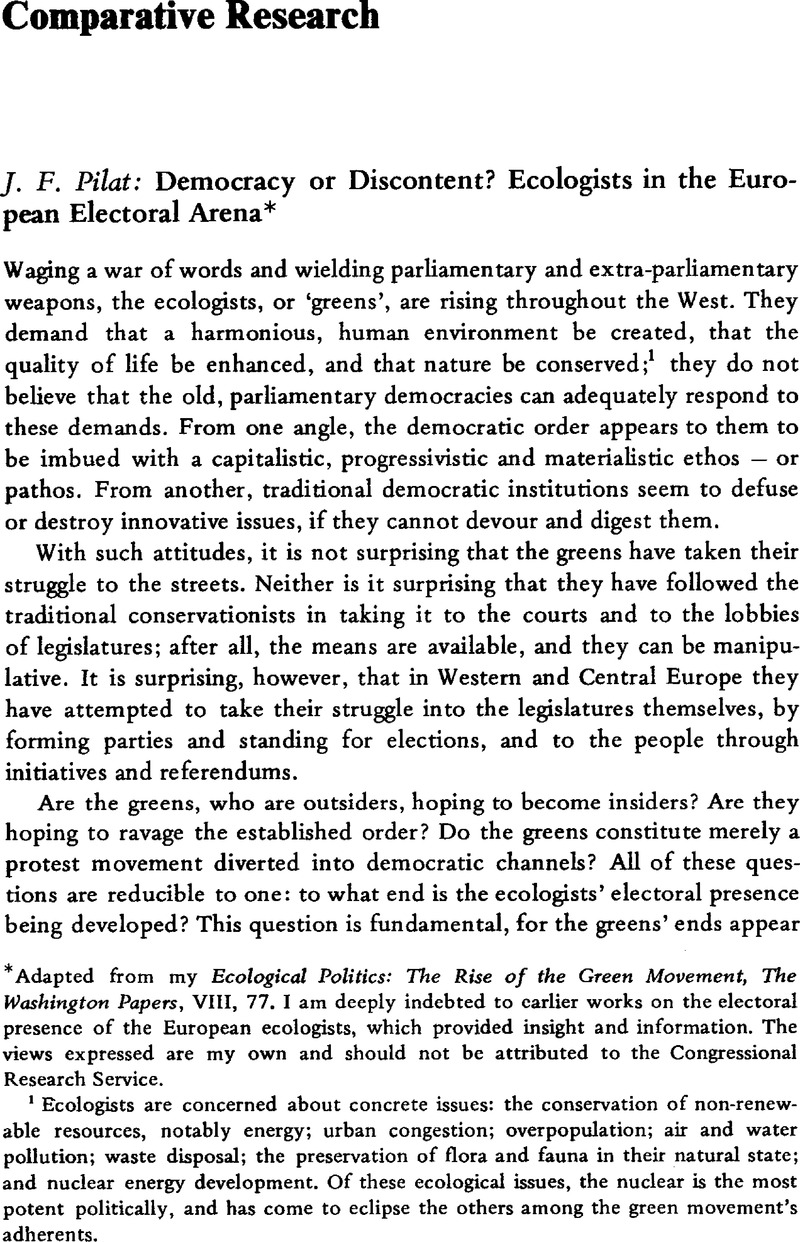Article contents
Democracy or Discontent? Ecologists in the European Electoral Arena*
Published online by Cambridge University Press: 28 March 2014
Abstract

- Type
- Comparative Research
- Information
- Copyright
- Copyright © Government and Opposition Ltd 1982
Footnotes
Adapted from my Ecological Politics: The Rise of the Green Movement, The Washington Papers, VIII, 77. I am deeply indebted to earlier works on the electoral presence of the European ecologists, which provided insight and information. The views expressed are my own and should not be attributed to the Congressional Research Service.
References
1 Ecologists are concerned about concrete issues: the conservation of non‐renewable resources, notably energy; urban congestion; overpopulation; air and water pollution; waste disposal; the preservation of flora and fauna in their natural state; and nuclear energy development. Of these ecological issues, the nuclear is the most potent politically, and has come to eclipse the others among the green movement's adherents.
2 Although the ecologists have gone beyond the limited environmental objectives of the traditional conservationists, their ends remain circumscribed. And as a con ‐ sequence of their attempts to infuse their concept of the environment with broader meaning it has become vague. It is because of this process that the ecologists' con ‐ sciousness and conception of the human use and abuse of the environment is so surprisingly undeveloped, that they have confusedly ‘synthesized’ a series of issues, beliefs, and dogmas that may be either of the Right or of the Left, and that their programmes and ideologies are equivocal.
And, although the greens no longer reside in the pale of politics occupied by their predecessors, their appeal is by no means universal. Ecological issues, in principle, appeal to virtually all ages, occupational groups and social strata. In practice, however, green voters tend to be young, educated members of the middle classes, with women somewhat more prevalent than men. Geographically, the greens have had their greatest electoral successes in urban and industrial areas, and in the vicinity of nuclear facilities. We may conclude from this that green votes depend on a sensitivity, by education or experience, to environmental degradation.
3 Nouvel Observateur, 19–25 December 1977.
4 Not even President Mitterrand, who declared the possibility of a nuclear referen ‐ dum under a government of the Left as early as 1977. Despite anti‐nuclear gestures during and after the presidential election campaign, Mitterrand has never renounced nuclear power per se, and further nuclear development in France appears assured.
5 See the Frankfurter Allgemeine, 8 October 1979; the General‐Anzeiger (Bonn), 8 October; and the Sueddeutsche Zeitung, 9 October.
6 Deutsche Zeitung (Bonn), 9 November 1979.
7 The party, however, has been threatened with a potentially divisive conflict over the nuclear issue. Tensions within the fragmented party, discernible for over a year, were exacerbated when the Hamburg SPD voted in February 1981 to withdraw support from the proposed Brokdorf nuclear power plant.
8 Die Presse (Vienna), 13 August 1979.
- 5
- Cited by


